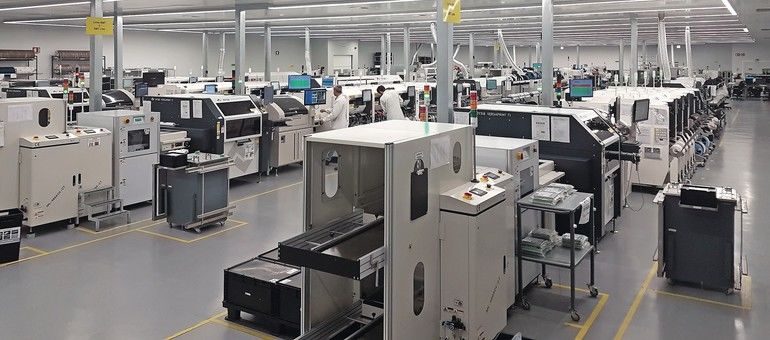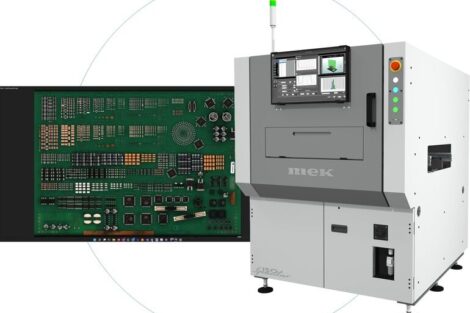While a thorough traceability system should be required for every electronics manufacturer, it’s not something regulated industry wide. Rather, these requirements are currently customer-driven or specific to certain safety-critical markets such as products for the automotive, aerospace or medical sectors.
Why traceability in Europe?
With billions of dollars of goods in the electronics manufacturing supply chain alone crossing the oceans and skies daily, we’re in a world where visibility and quality tracking is a necessity. As consumers in day to day purchasing, tracking and visibility of online purchases is automatically expected. So, why shouldn’t these expectations be held as well for circuit board manufacturing? It’s only a matter of time before more and more end customers are requiring detailed traceability analysis of their product’s entire production process.
In the European region, most electronics manufacturing is geared toward building high-quality goods for automotive, medical, consumer, and telecommunications industries. Many of these products cannot afford to go out into the field with a single defect – a minor issue in an automotive or medical product could have dire consequences to its end-user. Because of these stringent quality requirements, many European-based electronics manufacturers must offer a robust traceability system in order to beat the competition and keep customers.
Generally speaking, Europe is a bit ahead of the curve in terms of technological advancements, specifically related to Industry 4.0 and IIoT initiatives for manufacturing. Industry 4.0 was born in Germany, so early adoption of Smart Factory principles organically spread in nearby European countries. Even culturally, European-made products are associated with a better reputation than those manufactured elsewhere. Whether or not this perception is valid can be argued, but the fact remains, European-made products typically garner a higher price tag.
Thanks to this technologically centric mindset, automotive manufacturers are naturally drawn to have their goods assembled in this region. Not only do OEMs seek out EMS providers with the appropriate quality certifications, but they also need a manufacturer leveraging the latest traceability technology.
Within the high-tech regions of Western Europe, electronics manufacturers have the added burden of a highly competitive labor market. Labor doesn’t come affordably in most European countries, and these manufacturers typically have to spend more in order to both recruit and retain a proficient workforce. With a higher spend on wages, these same manufacturers need to find other ways to help reduce cost and remain competitive.
Additionally, many European based manufacturers also rely on a higher level of automation throughout the manufacturing process. With more of an emphasis on automation, these manufacturers lean on their traceability solution to ensure quality and optimize both efficiency and cost.
“… European-based manufacturers deal with higher labor costs and struggle to reduce operational costs; so, either by helping in reducing the universe of potentially defective product or by helping in finding the root cause for the defect itself, traceability is a fundamental tool to keep costs low and remain competitive,” commented Rui Vidal, Technical Advisor at Uartronica Electronica, a Portugese EMS provider specializing in electronics manufacturing for the automotive and telecommunications industries.
What is traceability?
A misconception in our industry has focused on material traceability alone. But material traceability isn’t all that’s required when we talk about traceability in SMT manufacturing. Without also verifying detailed process and product information, material traceability is a small Band-Aid when a more rigorous healing regiment of a full cast and physical therapy is needed.
A proven traceability solution will equip manufacturers with detailed reporting of the complete production process – who touched the product and when it was in process, what operations and equipment it went through and how that process transpired, what materials were used and where they came from – showing end-customers why they can trust in the quality produced. Anything less isn’t a complete traceability solution.
A robust traceability application proves a thorough quality management system – allowing end-users to trust that the products they receive will work correctly. Additionally, in the case of an unforeseen product warranty claim, traceability data can help find, mitigate and correct the root cause issue. And crucially, in the unfortunate event of a product recall, a strong traceability solution can narrow down the scope to necessary units, potentially saving an OEM millions of dollars.
“Traceability will support your toughest decisions and help you with your toughest challenges,” commented Mr. Vidal. “It’s like an all-round insurance you will use systematically to overcome difficulties, reduce costs, and find ways to improve.”
Most importantly, a traceability solution protects both business and brand by mitigating the risk of any type of recall. This keeps important names out of the media for a public product recall, which causes embarrassment. Remember the car manufacturer, Saturn? Probably not, because they had too many unnecessary recalls.
Traceability data
How a traceability solution is built and collects information is critical to the overall success. Anyone can create aesthetically pleasing traceability reports to send to end-customers, but is the data accurate? Is it easy to collect? Does it reflect what actually happened? Does it require an engineer to review and make adjustments?
A traceability solution should be powered by a strong connectivity and data management infrastructure. At the base level, connectivity to all of the machines used in production is a necessity, and the system must be able to harvest this machine data in real-time to automatically record everything that happens to the product.
Considering SMT manufacturing moves at such a fast-paced, ever-changing dynamic, all fed data should be managed by a reliable and scalable database that quickly and efficiently processes, stores and shares large volumes of data. With granular data automatically fed into a traceability application, precise reports of the production processes as well as materials used and consumed will be instantly available in a web-application with a single click of a button.
Traceability: make or buy?
Many of the potential customers are currently facing internal company disagreements amongst management as to whether it would be better to buy a traceability solution from a trusted third-party provider, or to make a custom traceability solution in-house.
To keep this simple, buying is the best option.
Playing devil’s advocate by taking an imaginary journey to build an internal traceability solution, the following questions should be asked: Are there four full-time employees available to be fully dedicated to this project? Is it a guarantee that they will be around to see this project to completion? And will they remain for the long term to maintain and update the system in response to evolving customer requirements for years to come? Do they have IT/code writing experience, the skills necessary to develop a scalable enterprise platform that will meet all current and future needs? Is all machine data easily accessible, especially in a format that is readable? How about a web-based reporting application to easily share with all customers?
Developing a traceability solution in-house and from scratch is not only a major time and financial investment, but an additional liability risk to a company. The longer it takes to build a system internally, the more time lost to close deals with customers and expand market share. Furthermore, what if the system turns out to be less reliable than anticipated? A loss of traceability data will not only cause chaos to production and booked orders, but it could also cause established customers to leave.
Off-the-shelf, proven solutions do exist for traceability in SMT manufacturing. Choosing a modular and flexible solution that can be up and running in a matter of months, that also offers long-term support and maintenance can be done. A third-party vendor that offers traceability within a larger connectivity and data management ecosystem can be considered, in order to easily expand to other products to improve manufacturing analytics and intelligence. The focus for internal talented resources should be on adding value instead of wasting energy on learning machine data code, and how to create complex databases and reports.
In conclusion
Traceability is a requirement, not a “nice-to-have”, and it’s not as simple as tracking material.
“… most customers across all fields of activity require EMS providers to trace materials and process down to PCB level,” commented Mr. Vidal. “It’s a mandatory tool, so you must use it to be able to play the game.”
A complete traceability solution will include detailed and accurate tracking and reporting of the entire production process including material, product and process information. The perfect solution will also easily complement existing systems. Be wary of a complete overhaul – instead it is advised to look for a third-party provider that’s willing to offer scalable and modular options to manufacturing tools.
“For sure, one can forget the idea of managing a (manufacturing) business without traceability. It’s just not possible,” added Mr. Vidal.
Cogiscan was one of the first software companies in the SMT industry to offer traceability to electronics manufacturers. Now recognized and respected as one of the leading connectivity and track, trace and control providers, hundreds of plants across the globe rely on their traceability application.
In der heutigen, sich schnell wandelnden Welt der Elektronikfertigung ist eine vollständige Traceabilitylösung mit detaillierter Rückverfolgbarkeit des kompletten Produktionsprozesses einschließlich Material-, Produkt- und Prozessinformationen unabdingbar.
Au vu des évolutions rapides auxquelles est confronté actuellement le secteur de la fabrication de composants électroniques, il est indispensable de disposer d’une solution complète offrant un suivi détaillé de l’ensemble du processus de production ainsi que des informations sur les matériaux, les produits et les processus.
В современном быстро меняющемся мире электронного производства важное значение имеет полная прослеживаемость всего производственного процесса, в т. ч. информации о материале, продукте и технологическом процессе.
Cogiscan
28-B boulevard de l’Aéroport
Bromont (Quebec) Canada J2L 1S6
Tel.: +1 (450) 534–2644
E-Mail: customercare@cogiscan.com
Website: www.cogiscan.com











